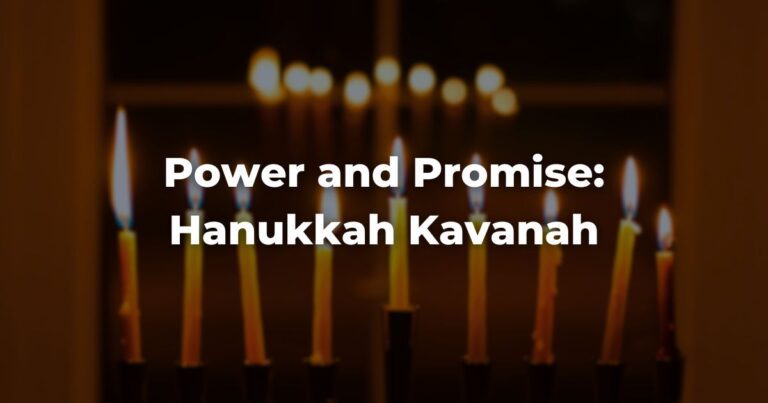When I was a kid, I never went to shul during the summer. I was at a camp that while kosher and Jew-ish, was not as observant as my life and my shul at home! As such, even for a very involved kid like me, I came into my knowledge of summer Jewish holidays slowly, sort of how I trudged up the near-vertical hills at camp, as if dragging myself through observance molasses.
As staff at a Ramah Camp, and before I could even understand what was happening, Judaism-wise, Tisha B’Av at camp happened to me. Tisha B’Av at camp is truly a full-body experience.
Everyone showered before a big dinner, like it was Shabbat. We dressed in black, and followed the paper bags of lights marking the path to the tennis courts … I mean, to services. We sat on the floor: on the tennis courts, or in the basketball pavilion, or, once, in a garden, and voices piped up in a sad little singsong. Eventually, it was my turn to sing, and I chanted the one line of text that had been assigned to me. The tune was a little chant that I still sometimes will say in my day-to-day wanderings.
After my line, I listened to the sounds more than the words and got lost in the buzzing of mosquitoes and the flicker of those paper bag lights.
After a few summers, I figured it all out:
- The walls were breached (17th of Tammuz) and we’re sad. Minor fast. Some minor programmatic changes during the three weeks must mean there had been war waged.
- And then, we had the vegetarian 9 days leading up to the 9th of Av.
- Culmination? Sit on the floor and read some text. No food.
Tisha B’Av commemoration at camp goes beyond the night reading Eicha. Perhaps you might be looking to make meaning out of the day.
I mentioned the chanting of Eicha, the Book of Lamentations. Many campers (and staff!) learn to chant Lamentations with a silly little tune. Everybody gets a turn to shine. We all mourn the loss of the Temple in the chorus of many voices, and we begin learning those lines leading up to the day of Tisha B’Av. It’s a way to infuse the 3 weeks into otherwise normal days at camp.
The music of the three weeks—and then, on Tisha B’Av—is also specific. One camp, I’ve heard, has a choir of staff that prepare specifically for erev Tisha B’Av. It’s seen as a huge honor to be singing that night to remember the Temples, lament the Lamentations, and turn toward a better future.
Then there’s the food—or lack thereof. Tisha B’Av is a fasting day—full fast, Yom-Kippur-style. For people over the age of 13 who choose to fast, fasting at camp is HARD. The dinner before Eicha is always good, as is the break-fast dinner after the fast ends after sunset. Some people choose to fast until Mincha, turning toward a future of a rebuilt Jerusalem. Some people are conflicted about eating—on Yom Kippur, on Tisha B’Av, or for other reasons. Holding space for members of the community who lean into the mitzvah is important, and they are given cool, calm places to hang out during the day of Tisha B’Av.
(See more: What If I Can’t (or Don’t Want to) Fast on Tisha B’Av?)
Also in the realm of food—there’s no meat during the 9 days, except for Shabbat—or if someone finishes learning a big chunk of TalmudReferring to one of two collections, the Jerusalem and Babylonian Talmuds, edited in the 6th century, that contains hundreds of years of commentary, discussion, and exploration of the ideas in the Mishnah. One could describe it as Mishnah + Gemara = Talmud Read more. Just like some community members don’t shave for the 3 weeks or for the 9 days, and some people wouldn’t eat meat during the sad weeks. You can mark many occasions at camp with what food is put out—and Tisha B’Av is no exception.
Tisha B’Av programming has run the realm from Eicha and then modified regular activities to full-scale, all-camp programs exploring the destruction of the Temples. Experiential programming around senseless hatred—and, even better, unlimited love—help kids (and staff like me) to understand why this commemoration deserves so much attention during a summer of otherwise unbridled fun.
Looking back at my decades of [Tisha B’Av at] camp, I’ve learned so many things.
Programming can be better with food (in this case, I am JUST KIDDING). Having a piece of the reading—a single pasuk—makes you feel invested in the entire operation. Being in community to process thousands of years of sad events in Jewish history is key, and it’s deeply moving to be able to look around you at hundreds of people who are not just still there but are living, learning, and loving Judaism. Learning through experience makes the holiday, meaning, and purpose of an event or holiday sink into your bones—and sometimes you can feel it working (if you’re sitting on a bumpy surface!).
Truly, though, what I’ve learned over the years is that the power of the community coming together, with appropriate support from the staff at camp, singing mournfully and clearly, while engaging in specific programming around turning from hate to love—that is what’s so powerful about Tisha B’Av at camp.
In fact, it’s that limitless love felt in the camp community that makes Tisha B’Av turn from sad to hopeful over the course of the day at camp, even if it’s super warm, and even if it’s super weird to have that sort of departure from your regularly scheduled activities. The limitless love, and not the senseless hatred, becomes part of who you are at camp, and stays with you throughout the rest of your life.
And it doesn’t hurt if the break fast dinner includes orange juice and brownies!
Author
-

Sara Beth Berman is a writer, advisor, and storyteller, has spent her career as an Experiential Jewish Educator and Consultant, working on curriculum development, professional learning, and programmatic initiatives. Sara Beth worked at The Jewish Education Project, UJA-Federation NY, the Foundation for Jewish Camp, Storahtelling, and a variety of summer camps. She has written for a variety of publications, including Kveller and Alma. She is proud to do work with the Gender Equity in Hiring Project. Sara Beth is a proud graduate of JTS’s Davidson School, and, as a career highlight, hosted a podcast for JTS about grief and loss.
View all posts




